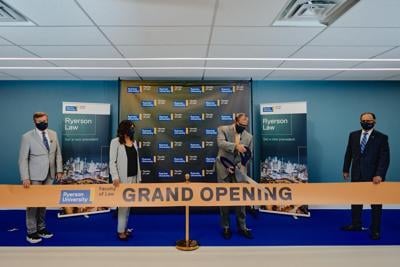It was a dramatic turn then when Aderonmu, who is Black, filed a complaint with the Human Rights Tribunal of Ontario and says he has faced racial discrimination at the school.
A Dec. 7 article in the Star gave profile to the complaint, detailing his claims that heâs been unable to get the financial support he says he needs to attend school.
As noted in the story, the school has denied his allegations.
I believe the Star was right to report this story. He has a public profile. The Star has written previously about him. Aderonmu himself wrote about his life story for pc28čÙÍűLife magazine.
The media have an important role to play when it comes to covering public tribunals and courts. News outlets like the Star have a legal and constitutional right to report on the details of proceedings before Ontarioâs human rights tribunal, as the eyes and ears of the public, in accordance with the open court principle.
That said, I did have several editorial concerns with this article. (Disclosure: I attended Ryersonâs journalism program and have a degree from the university.)
Ryersonâs law school is new, only welcoming its first students in 2020. Its goal, as detailed on its website, is to âreimagine legal education.â It speaks about progressive legal education, a new generation of lawyers, and more ambitious thinking on issues of representation and inclusion.
In line with that vision, more than 90 per cent of the tenure track law faculty hired as of July 2021 are from equity deserving groups, including those who are Black, Indigenous, racialized, 2SILGBTQ+, women and those with disabilities. Among the dean, associate and assistant deans and executive director, 80 per cent are racialized and 60 per cent are Black.
More than 50 per cent of the law schoolâs 320 students are racialized or Indigenous and a majority are from under-represented groups.
Such details about the students and faculty, which would have provided some important context to the schoolâs strategy and Aderonmuâs allegations, were not presented for readers in the story.
The school also notes that more than 90 per cent of scholarships and awards have gone to members of historically disadvantaged groups.
I was concerned also about the treatment of an allegation levelled specifically at Tanya De Mello, the law schoolâs assistant dean of student programming, development and equity, by Aderonmu in his tribunal complaint. Aderonmu charged that if he was a âCanadian-born white man,â he would have been treated with âmore respect and believability,â adding that De Mello âviews people of my background as inherently inferior.â
That is an especially pointed accusation that I think deserved balance in the story. De Mello, a human rights lawyer, has extensive experience in the areas of equity, inclusion and diversity.
As well, De Mello, who is racialized, created the , which has raised almost $100,000. Named after her parents, this award is given to a full-time student who identifies as Black or Indigenous.
Details about the scholarship and her professional credentials could have been provided context for readers on this specific aspect of Aderonmuâs complaint.
This same quote referencing De Mello was excerpted for use in an Insight section feature that highlights quotes from the weekâs news, in the Dec. 11 Saturday Star. There, the quote was presented in isolation, with neither the context of the story nor the schoolâs denials. The Star apologizes to De Mello for the decision to use the excerpt in this manner.
The headline and story called Aderonmu a âposter childâ for the school. I took that to be a figurative reference that he appeared to embody the kind of law student that the school aspires to welcome. Yet I do note that Ryerson says it has never used him in any of their promotional material.
I recognize that one challenge for the reporter and the school were the privacy considerations that restricted what university officials could say about the case, such as the financial assistance that was offered. Aderonmu did post details of a $10,000 scholarship and student loans on his GoFundMe page.
The reporter did seek comment from Ryerson, providing the university with Anderonmuâs complaint to the tribunal. The school declined to make anyone available for an interview but did provide written statements, the substantive elements of which were included in the story.
But there was additional information available that I think would have helped better frame the story for readers and provide some background to the schoolâs overall efforts on diversity and inclusion.


























